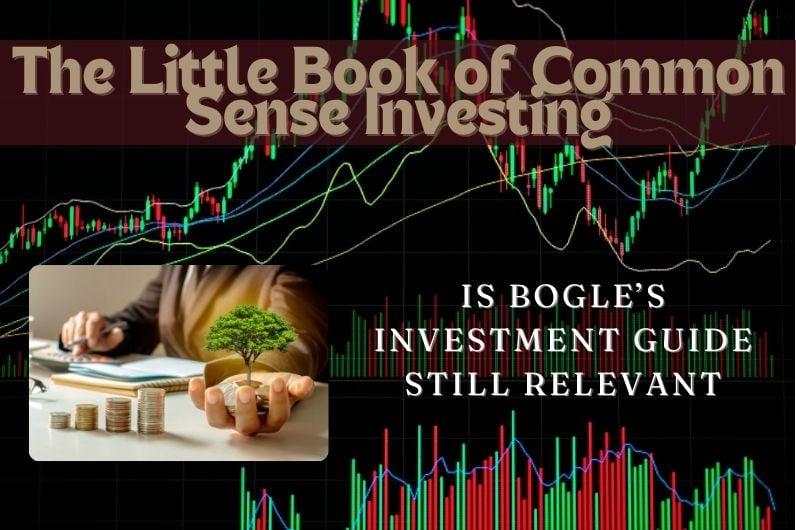The Little Book of Common Sense Investing Review: Is Bogle’s Investment Guide Still Relevant?

“The Little Book of Common Sense Investing,” written by investing legend John C. Bogle, is a guide to help investors follow a simple path to financial success in the often overwhelming world of stocks. Bogle, a pioneer in the investment world, is often credited for reshaping how people invest.
He founded Vanguard Group in 1974 and introduced the first index mutual fund in 1975. His book, first published in 2007, is considered one of the most influential guides to investing because of his straightforward approach to keep costs low, diversify, and hold on for the long term. This review explores the key principles outlined in Bogle’s book, their relevance today, and whether these principles are widely accepted in the investing community.
Affiliate
Take the Simply Investing Course to learn more about investing and dividends.
- Lifetime access with 27 self-paced lessons.
- Covers placing stock orders, building and tracking portfolios, when to sell, reducing fees and risk, etc.
- Learn the 12 Rule of Simply Investing
- Simply Investing Coupon Code – DIVPOWER15.
Bogle’s common sense investing approach is based on the belief that most investors can achieve better returns by investing in low-cost index funds rather than trying to pick individual stocks or timing the market. He also argues that by owning a small piece of the entire market, like with index funds, investors can benefit from the economy’s long-term growth without the risk of owning an individual stock, which can experience a lot of volatility.
Like fellow finance guru Burton G. Malkiel, who wrote “A Random Walk Down Wall Street,” Bogle’s approach to investing is heavily influenced by the Efficient Market Hypothesis (EMH), which suggests that stock prices already reflect all available information. According to EMH, it is nearly impossible to consistently outperform the market through stock picking or market timing, which is why Bogle favors index investing.
The Little Book of Common Sense Investing discusses the following principles.
Invest in Index Funds
An index fund is a type of mutual fund or exchange-traded fund (ETF) that aims to replicate the performance of a specific market index, such as the S&P 500. Bogle advocates investing in index funds because they offer diversification, low costs, and consistent performance over time.
Furthermore, index fund investments can be passively managed, saving on costs associated with paying a financial advisor management fees.
The Importance of Keeping Costs Low
Bogle emphasizes the importance of minimizing investment costs. High fees, whether from mutual fund expense ratios, trading commissions, or advisory fees, can significantly erode investment returns over time. In The Little Book of Common Sense Investing, Bogle presents data showing that the majority of actively managed funds end up underperforming their benchmarks once the associated management fees are paid. He urges investors to pay close attention to costs and favor low-cost index funds to maximize their returns.
Avoid Market Timing
Bogle warns against market timing, which is attempting to buy stocks when they are low and selling high. He argues that even professional investors often fail at market timing, and individual investors are even more likely to make costly mistakes. Instead, Bogle advocates for a buy-and-hold strategy, where investors stay the course and remain invested through market ups and downs.
Bogle provides evidence that the stock market has historically trended upward over the long term despite short-term volatility. By holding investments long-term, investors can take advantage of the compounding effect and the market’s overall growth.
Keep it Simple
Bogle argues that many investors complicate their portfolios with too many funds, frequent trading, and unnecessary risk. Instead, he suggests that a simple, well-diversified portfolio of low-cost index funds is sufficient for most investors.
Reinvest Dividends
Dividends are a significant component of total returns, and by reinvesting them, investors can take advantage of compounding, which is earning returns on top of returns. Compounding can significantly boost long-term returns.
Is Bogle’s Philosophy Widely Accepted?
John C. Bogle’s philosophy of low-cost, passive investing is widely accepted in the financial community. Since the publication of The Little Book of Common Sense Investing, the popularity of index funds has skyrocketed. Billions of dollars are invested in index funds, and many financial advisors recommend them as the foundation of a well-balanced portfolio.
Prominent investors like Warren Buffett have praised Bogle’s approach, and many financial institutions now offer a wide range of index funds to meet investor demand. The success of Vanguard, the company Bogle founded, is a testament to the widespread acceptance of his ideas.
However, there are still proponents of active management who believe in the potential to outperform the market.
Criticisms of The Little Book of Common Sense Investing
Some critics argue that active management can offer better returns in certain market conditions or that index investing leads to market inefficiencies. Bogle addresses these concerns by stating that the data overwhelmingly supports the long-term benefits of index investing. Bogle acknowledges that there may be short periods where active management outperforms the market. However, over the long term, the odds are heavily in favor of passive, low-cost investing.
Reader Reviews
The Little Book of Common Sense Investing scored well on several popular book review sites. Over 9000 reviewers on the website Goodreads rated Bogle’s book five stars. One reviewer joked, “What did I think? I’ll get back to you in about 30 years,” referring to a fundamental Bogle principle to hold investments long-term to see success.
Though many readers found the book informative, a few felt it was unnecessarily lengthy. “While it was indeed a little book, it was much longer than it needed to be. The whole book can be summed up in one sentence: Buy and hold a low-cost index fund. You’re welcome; you’ve essentially just read the book.”
Is The Little Book of Common Sense Investing Worth Reading?
The Little Book of Common Sense Investing by John C. Bogle offers timeless advice that has resonated with millions of investors. Its principles, focusing on low costs, diversification, and long-term investing, are as relevant today as they were when the book was first published. John C. Bogle fans have created websites, groups, and subreddits and refer to themselves as “Bogleheads.” Bogle’s approach to investing has inspired the creation of a fan base that achieved financial success by implementing his investment strategies and provides another reason to pick up his book.
Related Articles on Dividend Power
- 20 John Bogle Quotes to Guide Your Investment Strategy
- John Bogle Net Worth: Leaving a Lasting Legacy
Here are my recommendations:
Affiliates
- Simply Investing Report & Analysis Platform or the Course can teach you how to invest in stocks. Try it free for 14 days.
- Sure Dividend Newsletter is an excellent resource for DIY dividend growth investors and retirees. Try it free for 7 days.
- Stock Rover is the leading investment research platform with all the fundamental metrics, screens, and analysis tools you need. Try it free for 14 days.
- Portfolio Insight is the newest and most complete portfolio management tool with built-in stock screeners. Try it free for 14 days.
Receive a free e-book, “Become a Better Investor: 5 Fundamental Metrics to Know!” Join thousands of other readers !
*This post contains affiliate links meaning that I earn a commission for any purchases that you make at the Affiliates website through these links. This will not incur additional costs for you. Please read my disclosure for more information.
Nadia Tahir
Nadia Tahir is a freelance writer and content creator. She mostly writes in the areas of lifestyle and personal finance. She also enjoys writing on her blog about motherhood at This Mom is On Fire.
Source: The Little Book of Common Sense Investing Review: Is Bogle's Investment Guide Still Relevant?




